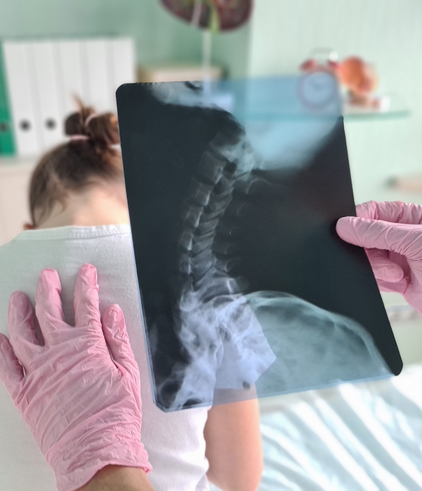Osteoporosis and Spinal Fractures
Bones of Resilience: Understanding Osteoporosis and Spinal Fractures

Osteoporosis, also referred to as the “silent thief” due to its subtle beginning, and fractures in the spine can also be severe in impacting someone’s quality of life. These situations besides causing physical discomfort may also be the cause of future complications if they won’t be treated. Our holistic approach serves to dismantle these diseases and provide powerful tools for self-care and prevention.
Osteoporosis and Its Impact on Spinal Health

Osteoporosis is a systemic bone disease characterized by a decrease in bone density and quality, making bones more susceptible to fractures. While osteoporosis can affect any bone in the body, spinal fractures are particularly common due to the compression forces exerted on the vertebrae during daily activities. These fractures can result in severe pain, limited mobility, and even deformity if left unaddressed.
Navigating the Diagnosis Process
Our clinic provides a comprehensive approach to treating spinal abnormalities, adapted to each patient’s specific needs and circumstances. Our team of specialists, led by seasoned spinal care professionals, uses innovative diagnostic procedures to properly determine the severity and progression of scoliosis or kyphosis.
Tailored Treatment Approaches for Optimal Results
At our clinic, we prioritize personalized care plans that address the unique needs and goals of each patient. Depending on the severity of osteoporosis and the presence of spinal fractures, treatment options may include:
- Medications: Prescription medications, such as bisphosphonates or hormone therapy, can help slow bone loss and reduce the risk of fractures.
- Lifestyle modifications: Adopting a bone-healthy lifestyle, including regular weight-bearing exercise, adequate calcium and vitamin D intake, and smoking cessation, can play a significant role in managing osteoporosis.
- Minimally invasive procedures: For patients with severe spinal fractures, minimally invasive procedures like vertebroplasty or kyphoplasty may be recommended to stabilize the spine and alleviate pain.
- Rehabilitation: Physical therapy and rehabilitation programs can help improve strength, flexibility, and posture, reducing the risk of falls and fractures.

Empowering Patients Through Education and Support
Empowering patients with knowledge and necessary resources is one of the basic principles for the effective management of osteoporosis and spinal fractures. Educating the community about these conditions is our primary objective. Dr Micheal will inform them about prevention, treatment alternatives, and lifestyle recommendations. Through open communication and collaboration, we seek to provide patients with the opportunity to make wise decisions regarding their health and well-being.
Take Control of Your Bone Health
Don’t let osteoporosis and spinal fractures dictate your life. Take the first step towards better bone health by scheduling a consultation with our experienced team. Together, we can develop a personalized plan to manage your condition and improve your quality of life. Contact us today to learn more and embark on your journey to stronger, healthier bones.
Bones of Resilience: Understanding Osteoporosis and Spinal Fractures
Osteoporosis, also referred to as the “silent thief” due to its subtle beginning, and fractures in the spine can also be severe in impacting someone’s quality of life. These situations besides causing physical discomfort may also be the cause of future complications if they won’t be treated. Our holistic approach serves to dismantle these diseases and provide powerful tools for self-care and prevention.
Osteoporosis and Its Impact on Spinal Health
Osteoporosis is a systemic bone disease characterized by a decrease in bone density and quality, making bones more susceptible to fractures. While osteoporosis can affect any bone in the body, spinal fractures are particularly common due to the compression forces exerted on the vertebrae during daily activities. These fractures can result in severe pain, limited mobility, and even deformity if left unaddressed.


Navigating the Diagnosis Process
The diagnosis of osteoporosis and spinal fractures usually reflects the development of symptomatology, which includes clinical evaluation, imaging studies, and bone density testing. One of the most important diagnostic tools is X-rays, a CT scan, and MRI scans, which are used to inform the extent of bone loss and detect any fractures or structural abnormalities. The process of bone density testing, i.e., dual-energy X-ray absorptiometry (DEXA), perfectly reveals how strong your bones are and hence helps doctors decide on an appropriate treatment.
Tailored Treatment Approaches for Optimal Results
At our clinic, we prioritize personalized care plans that address the unique needs and goals of each patient. Depending on the severity of osteoporosis and the presence of spinal fractures, treatment options may include:
- Medications: Prescription medications, such as bisphosphonates or hormone therapy, can help slow bone loss and reduce the risk of fractures.
- Lifestyle modifications: Adopting a bone-healthy lifestyle, including regular weight-bearing exercise, adequate calcium and vitamin D intake, and smoking cessation, can play a significant role in managing osteoporosis.
- Minimally invasive procedures: For patients with severe spinal fractures, minimally invasive procedures like vertebroplasty or kyphoplasty may be recommended to stabilize the spine and alleviate pain.
- Rehabilitation: Physical therapy and rehabilitation programs can help improve strength, flexibility, and posture, reducing the risk of falls and fractures.
Empowering Patients Through Education and Support
Empowering patients with knowledge and necessary resources is one of the basic principles for the effective management of osteoporosis and spinal fractures. Educating the community about these conditions is our primary objective. Dr Micheal will inform them about prevention, treatment alternatives, and lifestyle recommendations. Through open communication and collaboration, we seek to provide patients with the opportunity to make wise decisions regarding their health and well-being.
Take Control of Your Bone Health
Don’t let osteoporosis and spinal fractures dictate your life. Take the first step towards better bone health by scheduling a consultation with our experienced team. Together, we can develop a personalized plan to manage your condition and improve your quality of life. Contact us today to learn more and embark on your journey to stronger, healthier bones.

